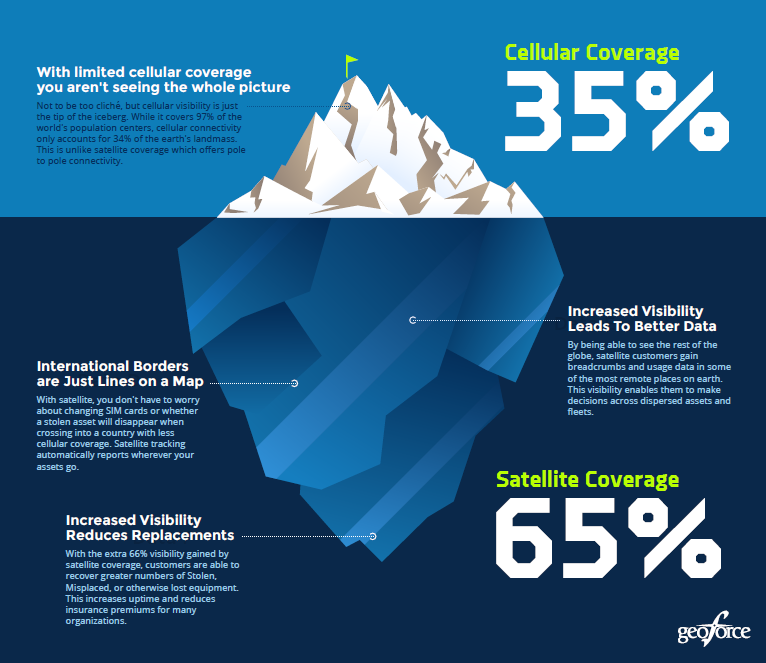In today’s fast-paced world, efficient asset tracking using a GPS tracker is crucial for businesses, especially for fleet managers and operations managers in a variety of industries, such as construction, equipment rental, oil & gas, mining, and agriculture. GPS tracking technology has reshaped how we monitor and manage valuable assets, offering unparalleled accuracy and real-time information.
Introduction to GPS Tracking Technology
Global Positioning System (GPS) technology uses a network of satellites to determine the precise location of an object on Earth. This technology is widely used in various industries, including transportation, oil & gas, equipment rental, construction, and freight/logistics, to track and safeguard their vehicles, equipment, and personnel.
How GPS Tracking Works
There is a wide range of types of tracking technology. GPS tracking devices leverage a network of satellites orbiting the Earth to pinpoint the exact location of an object. This process, known as trilateration, involves the device sending a signal to multiple satellites. The satellites then relay this signal back to the device, allowing it to calculate its precise position. This technology is incredibly versatile, enabling the tracking of a wide range of assets, from vehicles and equipment to people and other valuable assets. By providing real-time location data, GPS tracking enhances asset management, security, and operational efficiency.
Types of GPS Tracking Devices
There are several types of GPS tracking devices available, each designed to meet specific tracking needs:
- GPS Cellular Trackers: These devices use cellular networks to transmit location information, making them ideal for urban areas with dense cellular coverage. They offer strong signal strength and efficient power usage, often lasting several days on a single charge.
- GPS Satellite Trackers: Perfect for remote locations, these devices use satellite networks to transmit location data. They provide reliable tracking in areas without cellular service and are built to withstand harsh environments.
- GPS Tracking Devices with RFID: Combining GPS and RFID technology, these devices are excellent for inventory management and tracking assets within confined areas like warehouses. They offer the precision of RFID with the global reach of GPS.

By understanding the different types of GPS tracking devices, businesses can choose the most suitable option for their specific needs, whether it’s for urban tracking, remote locations, or inventory management.
Benefits of GPS Tracking for Fleet Management
Implementing GPS tracking in your fleet and rugged industries, such as construction, oil & gas, agriculture, mining, freight & logistics, and many more, provides numerous benefits:
- Enhanced asset management: Keep track of vehicles and equipment, reducing theft and unauthorized usage.
- Improved operational efficiency: Optimize routes, reduce fuel consumption, and enhance productivity.
- Real-time monitoring: Gain instant visibility into asset locations and statuses. With GPS tracking, you can view an asset’s GPS coordinates online in real-time, enhancing visibility and control over your assets.
- Better decision-making: Access historical data and analytics to make informed business decisions.
- Compliance and safety: Ensure compliance with regulations and improve safety protocols.
Comparison of GPS vs. RFID Technology for Tracking
GPS Tracking
- Accuracy: High precision, typically within a few meters.
- Range: Global coverage using satellite signals. A satellite tracking device ensures global coverage, making it ideal for tracking assets across long distances.
- Cost: Higher initial investment and operational costs.
- Applications: Suitable for tracking moving assets over long distances.
RFID Tracking
- Accuracy: Moderate precision, typically within a few centimeters to meters.
- Range: Limited to a few hundred meters.
- Cost: Lower initial investment and operational costs.
- Applications: Ideal for inventory management and tracking stationary assets within confined areas.
In summary: GPS is preferable for dynamic, long-range tracking needs, whereas RFID is cost-effective for localized, short-range tracking. You can see a more comprehensive GPS vs. RFID comparison in our recent blog.
GPS Trackers
- Precision: High precision with real-time tracking.
- Battery Life: Varies, typically longer with advanced power management.
- Privacy: Professional-grade security and encryption.
- Applications: Suitable for commercial and industrial use.
Apple AirTags
- Precision: Relies on a network of nearby Apple devices, less precise than GPS.
- Battery Life: Up to a year, user-replaceable.
- Privacy: Enhanced privacy features but limited to Apple’s ecosystem.
- Applications: Personal use, locating everyday items like keys and bags.
In summary: GPS trackers provide superior precision and reliability for business applications, while Apple AirTags are a convenient option for personal use. You can see a more robust GPS vs. AirTags comparison in our recent article.
Understanding GPS Cellular Trackers
GPS cellular trackers combine GPS technology with cellular networks to transmit location data. These trackers are popular for their:
- Signal strength: Strong connection in urban areas with dense cellular coverage.
- Battery consumption: Efficient power usage, with devices often lasting several days on a single charge. Many GPS cellular trackers also provide a low battery message to alert users when the device needs recharging.
- Global tracking: Ability to operate wherever there is cellular service.
The Role of GPS Satellite Trackers in Fleet Management
GPS satellite trackers use satellite communication to relay location data, making them ideal for remote and disconnected areas. These devices are designed to operate effectively in the most remote locations, ensuring continuous tracking even in the absence of cellular coverage. Benefits include:
- Coverage: Reliable tracking in areas without cellular service.
- Durability: Rugged design suitable for harsh environments.
- Cost: Higher operational costs due to satellite communication fees.
GPS Tracking in Remote Locations
Tracking assets in remote locations presents unique challenges, but GPS tracking devices, particularly satellite GPS tracking devices, offer robust solutions. These devices use satellite networks to transmit location information, making them ideal for areas with no cellular coverage.
Benefits of using GPS tracking devices in remote locations include:
- Tracking Most Valuable Assets: Whether it’s cargo containers, vehicles, or other valuable assets, GPS tracking devices provide real-time location data, ensuring you always know where your assets are.
- Overcoming Common Challenges: GPS tracking devices are designed to withstand harsh environments and operate efficiently in areas with limited cellular coverage. This makes them indispensable for industries operating in remote locations.
By leveraging satellite GPS tracking devices, businesses can maintain visibility and control over their most valuable assets, regardless of their location.
Overcoming Common Challenges
While GPS tracking technology offers numerous benefits, it also comes with challenges that need to be addressed:
- Limited Cellular Coverage: In areas with limited cellular coverage, GPS tracking devices can use satellite networks to transmit location information, ensuring continuous tracking.
- Harsh Environments: GPS tracking devices are often built to withstand extreme temperatures and weather conditions, making them suitable for use in harsh environments.
- Battery Life: Long battery life is essential for GPS tracking devices used in remote locations. Many devices are designed to last several days to years on a single charge, reducing the need for frequent maintenance.
- Cost: While GPS tracking devices can be more expensive than other tracking methods like RFID, they offer superior accuracy and global coverage, making them a cost-effective solution in the long run.
By addressing these challenges, businesses can fully leverage the benefits of GPS tracking technology, ensuring efficient and reliable asset management across various environments.
Choosing the Right GPS Tracking Solution for Your Business
When selecting a GPS tracking solution, consider:
- Your specific needs: Fleet size, asset types, and operational areas.
- Technology features: Real-time tracking, battery life, and durability. Consider whether a satellite tracker is necessary for your operations in remote areas without cellular coverage.
- Customer support from providers like Geoforce, the leader in ruggedized GPS tracking solutions.
- Cost-effectiveness and ROI.
Conclusion and Next Steps
GPS tracking technology is an invaluable tool for fleet managers and construction companies, offering enhanced efficiency, security, and operational insights. By carefully selecting the right GPS tracking solution, you can transform your asset management processes and drive business growth.Ready to elevate your tracking capabilities? Get a free quote from Geoforce and discover the power of GPS technology in action.
Publisher: Source link











